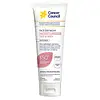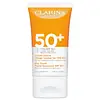What's inside
What's inside
 Key Ingredients
Key Ingredients

 Benefits
Benefits

 Concerns
Concerns

 Ingredients Side-by-side
Ingredients Side-by-side

Octocrylene 3%
UV AbsorberButyl Methoxydibenzoylmethane 3%
UV Absorber4-Methylbenzylidene Camphor 2%
UV AbsorberEthylhexyl Triazone 2%
UV AbsorberAloe Barbadensis Leaf Juice
Skin ConditioningMagnesium Aluminum Silicate
AbsorbentCetearyl Alcohol
EmollientDimethicone
EmollientTocopheryl Acetate
AntioxidantTetrasodium EDTA
Hydroxyacetophenone
AntioxidantIsopropyl Palmitate
EmollientNeopentyl Glycol Diheptanoate
EmollientPhenoxyethanol
PreservativePolyglyceryl-3 Diisostearate
EmulsifyingWater
Skin ConditioningSilicon
AbrasiveStearic Acid
CleansingTriethanolamine
BufferingXanthan Gum
EmulsifyingOctocrylene 3%, Butyl Methoxydibenzoylmethane 3%, 4-Methylbenzylidene Camphor 2%, Ethylhexyl Triazone 2%, Aloe Barbadensis Leaf Juice, Magnesium Aluminum Silicate, Cetearyl Alcohol, Dimethicone, Tocopheryl Acetate, Tetrasodium EDTA, Hydroxyacetophenone, Isopropyl Palmitate, Neopentyl Glycol Diheptanoate, Phenoxyethanol, Polyglyceryl-3 Diisostearate, Water, Silicon, Stearic Acid, Triethanolamine, Xanthan Gum
Homosalate 10%
Skin ConditioningBenzophenone-3 6%
UV AbsorberEthylhexyl Salicylate 5%
UV AbsorberButyl Methoxydibenzoylmethane 3%
UV AbsorberOctocrylene 2.7%
UV AbsorberWater
Skin ConditioningC12-15 Alkyl Benzoate
AntimicrobialButyloctyl Salicylate
Skin ConditioningDipropylene Glycol Dibenzoate
EmollientButylene Glycol
HumectantAlcohol
AntimicrobialAluminum Starch Octenylsuccinate
AbsorbentAloe Barbadensis Leaf Juice
Skin ConditioningPPG-15 Stearyl Ether Benzoate
EmollientMannitol
HumectantCetearyl Alcohol
EmollientParfum
MaskingPotassium Cetyl Phosphate
EmulsifyingGlycerin
HumectantPhenoxyethanol
PreservativeAcrylates/C10-30 Alkyl Acrylate Crosspolymer
Emulsion StabilisingSodium Ethylhexylglyceryl Ascorbate
AntioxidantXanthan Gum
EmulsifyingTromethamine
BufferingTocopherol
AntioxidantCyclodextrin
AbsorbentPisum Sativum Extract
Skin ConditioningCassia Alata Leaf Extract
AstringentFaex Extract
Skin ConditioningDextrin
AbsorbentHydrolyzed Adansonia Digitata Extract
EmollientHelianthus Annuus Seed Oil
EmollientOlea Europaea Leaf Extract
PerfumingPlatanus Occidentalis Bark Extract
Skin ProtectingBenzyl Salicylate
PerfumingLimonene
PerfumingButylphenyl Methylpropional
PerfumingHexyl Cinnamal
PerfumingCitronellol
PerfumingHomosalate 10%, Benzophenone-3 6%, Ethylhexyl Salicylate 5%, Butyl Methoxydibenzoylmethane 3%, Octocrylene 2.7%, Water, C12-15 Alkyl Benzoate, Butyloctyl Salicylate, Dipropylene Glycol Dibenzoate, Butylene Glycol, Alcohol, Aluminum Starch Octenylsuccinate, Aloe Barbadensis Leaf Juice, PPG-15 Stearyl Ether Benzoate, Mannitol, Cetearyl Alcohol, Parfum, Potassium Cetyl Phosphate, Glycerin, Phenoxyethanol, Acrylates/C10-30 Alkyl Acrylate Crosspolymer, Sodium Ethylhexylglyceryl Ascorbate, Xanthan Gum, Tromethamine, Tocopherol, Cyclodextrin, Pisum Sativum Extract, Cassia Alata Leaf Extract, Faex Extract, Dextrin, Hydrolyzed Adansonia Digitata Extract, Helianthus Annuus Seed Oil, Olea Europaea Leaf Extract, Platanus Occidentalis Bark Extract, Benzyl Salicylate, Limonene, Butylphenyl Methylpropional, Hexyl Cinnamal, Citronellol
 Reviews
Reviews

Ingredients Explained
These ingredients are found in both products.
Ingredients higher up in an ingredient list are typically present in a larger amount.
Aloe Barbadensis Leaf Juice comes from leaves of the aloe plant. Aloe Barbadensis Leaf Juice is best known for helping to soothe sunburns. It is also anti-inflammatory, moisturizing, antiseptic, and can help heal wounds.
Aloe is packed with good stuff including Vitamins A, C, and E. These vitamins are antioxidants, which help fight free-radicals and the damage they may cause. Free-radicals are molecules that may damage your skin cells, such as pollution.
Aloe Barbadensis Leaf Juice also contains sugars. These sugars come in the form of monosaccharides and polysaccharides, folic acid, and choline. These sugars are able to help bind moisture to skin.
It also contains minerals such as calcium, 12 anthraquinones, fatty acids, amino acids, and Vitamin B12.
Learn more about Aloe Barbadensis Leaf JuiceAlso known as Avobenzone, this ingredient is a chemical sunscreen filter that provides protection in the UV-A range.
Avobenzone is globally approved and is the most commonly used UV-A filter in the world.
Studies have found that avobenzone becomes ineffective when exposed to UV light (it is not photostable; meaning that it breaks down in sunlight). Because of this, formulations that include avobenzone will usually contain stabilizers such as octocrylene.
However, some modern formulations (looking at you, EU!) are able to stabilize avobenzone by coating the molecules.
Avobenzone does not protect against the UV-B range, so it's important to check that the sunscreen you're using contains other UV filters that do!
The highest concentration of avobenzone permitted is 3% in the US, and 5% in the EU.
Learn more about Butyl MethoxydibenzoylmethaneCetearyl alcohol is a mixture of two fatty alcohols: cetyl alcohol and stearyl alcohol. It is mainly used as an emulsifier. Emulsifiers help prevent the separation of oils and products. Due to its composition, it can also be used to thicken a product or help create foam.
Cetearyl alcohol is an emollient. Emollients help soothe and hydrate the skin by trapping moisture.
Studies show Cetearyl alcohol is non-toxic and non-irritating. The FDA allows products labeled "alcohol-free" to have fatty alcohols.
This ingredient is usually derived from plant oils such as palm, vegetable, or coconut oils. There is debate on whether this ingredient will cause acne.
Due to the fatty acid base, this ingredient may not be Malassezia folliculitis safe.
Learn more about Cetearyl AlcoholOctocrylene protects skin from sun damage. It absorbs UV-B with peak absorption of 304 nm. It is a common sunscreen ingredient and often paired with avobenzone, a UVA filter. This is because octocrylene stabilizes other sunscreen ingredients by protecting them from degradation when exposed to sunlight. Octocrylene is a photostable ingredient and loses about 10% of SPF in 95 minutes.
Octocrylene also acts as an emollient, meaning it helps skin retain moisture and softens skin. It is oil-soluble and hydrophobic, enhancing water-resistant properties in a product.
Those who are using ketoprofen, a topical anti-inflammatory drug, may experience an allergic reaction when using octocrylene. It is best to speak with a healthcare professional about using sunscreens with octocrylene.
The EU allows a maximum of these concentrations:
Learn more about OctocrylenePhenoxyethanol is a preservative that has germicide, antimicrobial, and aromatic properties. Studies show that phenoxyethanol can prevent microbial growth. By itself, it has a scent that is similar to that of a rose.
It's often used in formulations along with Caprylyl Glycol to preserve the shelf life of products.
Water. It's the most common cosmetic ingredient of all. You'll usually see it at the top of ingredient lists, meaning that it makes up the largest part of the product.
So why is it so popular? Water most often acts as a solvent - this means that it helps dissolve other ingredients into the formulation.
You'll also recognize water as that liquid we all need to stay alive. If you see this, drink a glass of water. Stay hydrated!
Learn more about WaterXanthan gum is used as a stabilizer and thickener within cosmetic products. It helps give products a sticky, thick feeling - preventing them from being too runny.
On the technical side of things, xanthan gum is a polysaccharide - a combination consisting of multiple sugar molecules bonded together.
Xanthan gum is a pretty common and great ingredient. It is a natural, non-toxic, non-irritating ingredient that is also commonly used in food products.
Learn more about Xanthan Gum